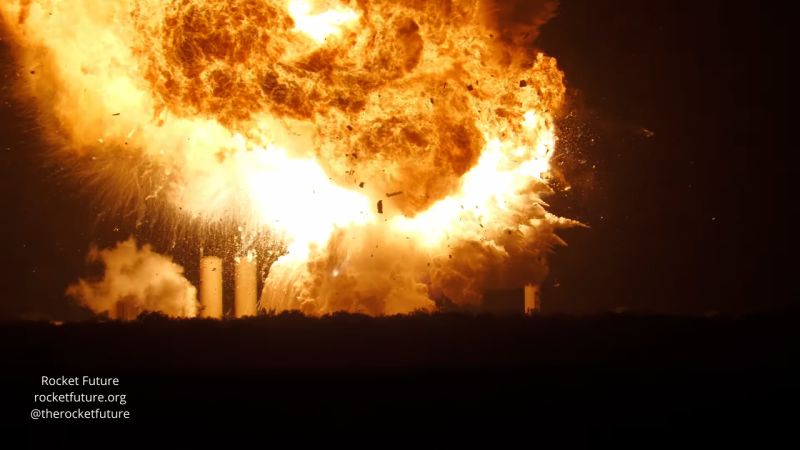Elon Musk, the prominent entrepreneur known for his ventures in space exploration, electric cars, and artificial intelligence, has once again found his attention diverted back to the intricacies of his businesses. However, a recent incident has cast a shadow over one of his most critical enterprises: SpaceX. A Starship rocket, undergoing routine ground testing, experienced a catastrophic explosion, resulting in a massive fireball. This marks a significant setback in Musk’s ambitions for consistent space travel and underlines the unpredictable nature that often accompanies high-stakes technological endeavors.
This explosion is not an isolated incident; it represents the fourth failure in consecutive tests for SpaceX’s Starship program. This string of disappointments comes at a time when Musk’s other commercial interests, including Tesla and recent political involvements, have struggled to regain their footing. The failures raise questions about SpaceX’s capability as it attempts to fulfill the task of returning American astronauts to the moon by 2027, a mission funded by NASA to the tune of approximately $4 billion. Although SpaceX has maintained that previous tests were valuable in advancing its engineering, each attempt has culminated in notable mid-flight failures, rendering the ambitious timeline increasingly questionable.
Central to SpaceX’s philosophy is a practice known as “rapid iterative development,” which advocates for the construction of affordable prototypes and frequent testing. This method prioritizes speed and adaptability over the traditional, slower engineering approaches often deemed more methodical. The company asserts that these failures during the developmental phase should not be seen as fatal flaws but rather as vital learning opportunities in their quest for eventual success in space travel.
Yet, the tumultuous backdrop of recent high-profile events adds complexity to Musk’s narrative. After a controversial tenure as a significant advisor during the Trump administration, Musk has been attempting to rebuild his image, focusing on his businesses once more. Tesla, in particular, has faced challenges perceived to be exacerbated by his political affiliations. In light of this and with aspirations to focus on safety and reliability, Musk has set a limited rollout for Tesla’s ambitious driverless robotaxi service, aiming to launch in Austin soon with only a select few vehicles on the road to start.
Simultaneously, Musk faces pressure from Texas lawmakers urging him to delay the robotaxi launch due to impending new regulations related to autonomous vehicles. A report indicating a suspension in production lines for Tesla’s flagship Cybertruck and the Model Y – citing maintenance at the Austin plant – has further contributed to fluctuations in the company’s stock prices. Adding to the woes, a rising competitor from China, BYD, surpassed Tesla in pure battery vehicle sales in Europe for the first time, bringing to light the increasing competition in a marketplace once dominated by Musk’s brand.
On another front, Musk also grapples with significant financial challenges at his artificial intelligence venture, xAI, which reports escalating costs approximating $1 billion per month, outstripping its revenue. In a testament to his characteristic defiance, Musk dismissed the claims of unsustainable financial burn rates reported by Bloomberg, branding them as nonsense.
In light of criticism and public perception issues, Musk has not shied away from defending his operational philosophies. In controversial instances pertaining to the outputs of his chatbot, Grok, he took to X (formerly known as Twitter) to counter a data-driven assessment related to political violence, illustrating his commitment to confronting narratives he perceives as misaligned with his views.
Despite setbacks, Musk’s demeanor publicly suggests a level of nonchalance. He has expressed hope that Starship would meet its first launch deadline to Mars by the close of next year, even as skepticism around feasibility grows. Referring to the destruction of yet another prototype, Musk lightheartedly posted “Just a scratch” alongside a memorial message for the fallen Starship. His use of humor in such situations, notably through memes, seems intended to mitigate the perception of failure.
Musk’s ongoing ventures, both promising and problematic, paint a complex picture of an innovator continually balancing audacious ambitions against the stark realities of the technological landscape. Through waves of challenges and perceived setbacks, Musk remains a figure whose journeys reflect the unpredictable essence of innovation. Even in defeat, he cultivates a narrative of resilience, articulated through his social media expression and steadfast pursuit of pioneering frontiers.



